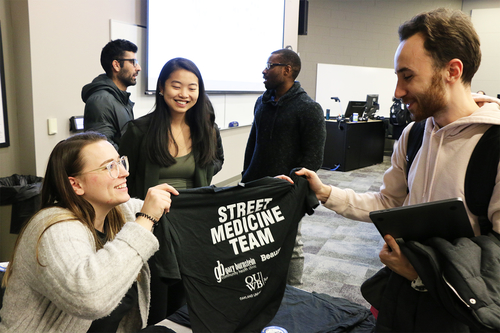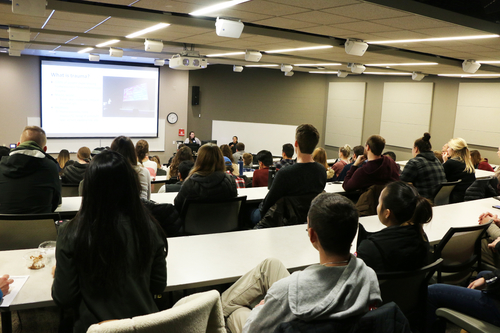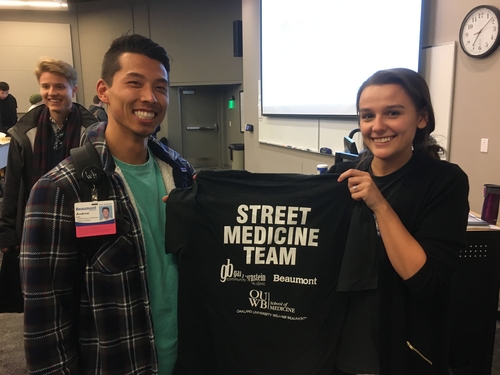
Students from Oakland University William Beaumont School of Medicine are taking to the streets of Pontiac through a new program aimed at helping individuals who are homeless and need medical care.
OUWB’s Street Medicine program — the first of its kind in Oakland County — begins Friday, Nov. 22, when the first group of students will be helping those in need at the Hope Hospitality & Warming Center in Pontiac.
More than 70 OUWB medical students attended the program’s orientation on Nov. 15 — the culmination of about two years of work led by third-year OUWB students Lexie Ranski and Tori Drzyzga.
Ranski said the intent is for Street Medicine to be a permanent OUWB program.
“The benefit that this is going to bring to people in the community is going to be huge,” Ranski said. “We’ve been working so hard on this. It’s going to be amazing.”
Drzyzga said it feels “surreal” to be on the verge of launching the program. The two M3s have been working on developing the program since October of their first year at OUWB.
“Health care is not a privilege but a right for everyone to have,” Drzyzga said. “If we can bring it, at least someone’s getting it to them.
“We’re helping in any way we can,” she added.
Meeting a need
By definition, the concept of street medicine is “a collaboration of health and social services that address the unique needs and circumstances of the unsheltered homeless.” Today, programs exist in more than 85 cities and 15 countries across five continents.”
Ranski and Drzyzga were first exposed to street medicine while they were undergrads at Wayne State University. That program focuses on people who are homeless in Detroit.
“We fell in love with serving people experiencing homelessness and working with the underserved,” Ranski said. “I was like ‘Wow, when I go to med school I really want to do this, too.’”
The duo saw an opportunity to start a program at OUWB almost as soon as they started attending the school. Ranski said they identified a significant need in Pontiac — a city about 10 minutes west of OUWB’s Rochester campus.
A strong need exists for such a program in Pontiac, said Jason Wasserman, Ph.D., associate professor, Department of Foundational Medical Studies and Department of Pediatrics, OUWB.
“Pontiac’s been hit every bit as hard as Detroit with factors like the declining manufacturing industry, massive inflation that began in the 1970s, and, especially, declines in affordable housing,” said Wasserman, who serves as advisor to OUWB’s Street Medicine program.
“All of these factors exacerbate the problem of homelessness — and Pontiac has faced all of these problems,” he said.
Wasserman said it makes sense that the idea of an OUWB Street Medicine program was met with enthusiasm by various organizations that work with the homeless population in Pontiac.
Those organizations included Oakland County Homeless Healthcare Collaboration, a group of community partners led by the Oakland County Health Division who serve homeless and vulnerable populations to discuss their experiences, identify concerns, share ideas, and develop a plan to address the needs of these clients.
Another organization that welcomed OUWB’s Street Medicine program is the Gary Burnstein Community Clinic, a Pontiac-based nonprofit that provides free medical care to the uninsured.
 The clinic will serve as a home base for the street medicine program. Further, the program will use the clinic for storage as well as its emergency medical records (EMR) system for documenting care provided to patients.
The clinic will serve as a home base for the street medicine program. Further, the program will use the clinic for storage as well as its emergency medical records (EMR) system for documenting care provided to patients.
"I’m ecstatic about it…they’ve been working on this for so long,” said Justin Brox, M.D., executive director of the Gary Burnstein Community Health Clinic, who attended the orientation (see photo). “It’s going to meet a big need in the community.”
So far, the program has received minimal levels of financial support, including a Community Service Mini-Grant from Compass, OUWB’s department for community engagement.
Wasserman said more robust levels of support will help keep the program in place.
"With additional funding, we could not only ensure the sustainability of the existing program, but expand its impact and reach in all sorts of exciting and innovative ways," he said.
Program origins
Wasserman said Ranski and Dryzyga are the third group of students who have presented the concept of a street medicine program at OUWB. Based on their commitment and passion for the project early in the process, Wasserman said he knew they “had a real shot at getting it done.”
That was important, he said, because he knew it would require a “substantial amount of work and effort.”
“It’s a complex thing for an institution to back for a number of reasons,” he said. “They primarily need to make sure students are safe, and that they are conducting themselves in a way that represents the institution well and ethically.”
“I think (approval of the project) is a testament to what Lexie and Tori built out and how they put this all together, including drawing on best practices of the national organization,” Wasserman said.
Ranski has served as a member of the Street Medicine Institute Student Coalition (SMISC), the student portion of the National Street Medicine Institute. She also recently attended the International Street Medicine Symposium in Pittsburgh.
Those experiences, along with her and Dryzyga’s previous exposure to street medicine as an undergrad, have prepared them to deliver a meaningful street medicine program, Ranski said.
In short, they know it involves much more than simply finding people who are homeless.
“(People who are homeless) don’t utilize a lot of resources in the community, don’t stay in the shelters, don’t use clinics, are very shy of the medical system — in fact, they’re not very trusting of the medical system,” she said. “That’s what street medicine is — it’s really going out and meeting people where they are, with what they have, and listening to their priorities and what they want.”
Building a program
Initially, a team of four OUWB students will go out with a physician and representatives from Projects for Assistance in Transition from Homelessness (PATH), a street outreach team that is part of Community Housing Network and also works to help people who are homeless.
“It’s a good connection for OUWB’s Street Medicine program because (PATH representatives) know the streets, where people are going to be, and already have established relationships,” Wasserman said. “We can piggyback on what they’ve already built.”
 Teams will provide acute medical care, and help individuals with basic needs like clothing and food. They’ll have over-the-counter medications, such as ibuprofen, aspirin, Benadryl, Sudafed, and Claritin, and be able to provide other services, like wound care. (They will be identified by wearing shirts like the one in this photo featuring Ranksi and OUWB student Andrew Lee.)
Teams will provide acute medical care, and help individuals with basic needs like clothing and food. They’ll have over-the-counter medications, such as ibuprofen, aspirin, Benadryl, Sudafed, and Claritin, and be able to provide other services, like wound care. (They will be identified by wearing shirts like the one in this photo featuring Ranksi and OUWB student Andrew Lee.)
Early sessions in the program will be held at Hope Hospitality & Warming Center as a way of introducing OUWB’s program to the homeless community. Once the presence of OUWB’s Street Medicine program is established within the community, teams will move beyond the shelter and into the streets.
Ranski said as more physicians come on board with the project, more teams will be able to provide care.
As the program consistently provides care and grows, Ranksi and Dryzyga said they expect the value of the program will increase for all involved.
“You really form relationships with people when you see them every week,” Ranski said. “You get to know their names, hear their stories about why they’re in the position they’re in.
“I would hear all these horrible experiences they had when they went to a physician or ER — or that they couldn’t go to a clinic because there aren’t a lot in the city,” she said. “I felt it was not right that there are these disparities for people who can’t control their situations. I wanted to give back in a bigger way that wasn’t just handing out hot coffee.”
Dryzyga added that when people who are homeless receive care from OUWB’s Street Medicine program, it has the potential to have an impact larger than the moment.
“I think it helps bridge the gap between this population and the medical system,” she said. “Because if they can at least trust somebody, then maybe when we’re not there in the future they can have some trust in the health care system.”
Street Medicine Pontiac at OUWB has a Facebook page at @streetmedicinepontiac.
For more information, contact Andrew Dietderich, marketing writer, OUWB, at adietderich@oakland.edu.

